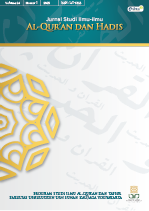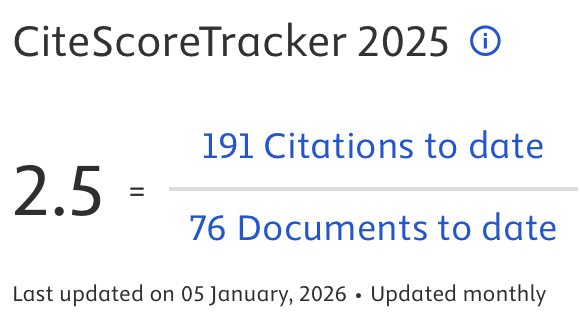The Evolution of 'Kafir' in the Qur’an: A Diachronic Study on the Socio-Political Influences Shaping Its Meaning
DOI:
https://doi.org/10.14421/qh.v25i1.5564Keywords:
Kafir, Diachronic Study, Qur’an Interpretation, Socio-Political Context, Historical-Critical AnalysisAbstract
The term 'kafir' in the Qur’an possesses a complex meaning, which is one of the most pivotal elements of the Qur’an, influenced by the context from the time of revelation to the practice of the interpretive community. Considering the element of time, the meaning of 'kafir' has changed over the years; it is dynamic and dependent on temporal, spatial, and socio-political contexts. This paper explores the historical-critical changes in the meaning of 'kafir' over time, known as a diachronic study, by considering the socio-political backgrounds accompanying these emerging meanings. The objective of this paper is to foster a more comprehensive understanding of 'kafir' as a dynamic and discursive term throughout history. The findings indicate that with the continuous evolution of context, different understandings and meanings have surfaced, rendering the meaning of 'kafir' fluid. The term dates back to pre-Islamic times and was later used in the Qur’an within a new conceptual framework. Within the interpretive community, political divisions in the first centuries of Islam contributed to diverse meanings of 'kafir.' In the modern era, the predominance of the nation-state concept has brought the term 'kafir' into debates concerning the relationship between Muslims and non-Muslims and their status within the nation-state. This type of historically grounded diachronic study helps to avoid essentialism in the study of historically significant terms and concepts related to Muslim societies, which are still often examined in popular academic discourse.
 Abstract viewed: 976 times
|
Abstract viewed: 976 times
|
 PDF downloaded = 777 times
PDF downloaded = 777 times
References
Abduh, Syekh Muhammad. Risalah Tauhid. Jakarta: Bulan Bintang, 1976.
Afsaruddin, Asma. Striving in the Path of God: Jihād and Martyrdom in Islamic Thought. Oxford: Oxford University Press, 2013.
Al-’Aqdu al-Tsamin Fī Dawāwini Asy-Syu’arā as-Sittah al-Jāhiliyīn. Madīnah: al-Madrasah al-Kuliyyah al-Mālikiyyah, 1869.
Amstrong, Karen. Muhammad Sang Nabi: Sebuah Biografi Kritis. Sirikit Syah. Surabaya: Risalah Gusti, 2001.
Arkound, M, and Louis Gardet. Islam Kemaren Dan Hari Esok. Ahsin Mohammad. Bandung: Penerbit Pustaka, 1997.
Asfahanī, Ragīb Al. Muʻjam Mufradāt Li Garīb Al-Qurʼān. Beirut: Dār al-Fikr, n.d.
Aziz, Abdul. Chiefdom Madinah: Kerucut Kekuasaan Pasa Zaman Awal Islam. Ahmad Baedowi. Jakarta: Pustaka Alfabet, 2016.
Baharuddin, Mochammad Achwan, Moh Erfan Soebahar, and Siti Mujibatun. “Validity of Pre-Islamic Arabic Literature as a Source of Authentication of Hadis.” Jurnal Studi Ilmu-Ilmu Al-Qur’an Dan Hadis 21, no. 2 (July 29, 2020): 449–68.
Bāqī, Muḥammad Fū’ad Abdul. Al-Muʻjam al-Mufahras Li Alfāẓ al-Qur’an al-Karīm. Beirut: Dār al-Fikr, 1981.
Barir, Muhammad. “Kesetaraan Dan Kelas Sosial Dalam Perspektif Al-Qur’an.” Jurnal Studi Ilmu-Ilmu Al-Qur’an Dan Hadis 15, no. 1 (January 13, 2014): 61–92.
Bauer, Karen. Gender Hierarchy in the Qur’an: Medieval Interpretations, Modern Responses. Cambridge: Cambridge University Press, 2015.
Bauer, Karen, and Feras Hamza. Women, Households, and the Hereafter in the Qur’an: A Patronage of Piety. Oxford, New York: Oxford University Press, 2024.
Dzahabi, Muhammad Husein Al. At-Tafsir Wa al-Mufassirun. Kairo: Maktabah Wahbah, 2000.
Fairuzabadiy, Abū Ṭāhir Muḥammad bin Ya’qūb. Tanwīr Al-Miqbās Min Tafsīr Ibnu ‘Abbās. Beirut: Dār al-Fikri, 1951.
Fikriyati, Ulya. Corak Akhbari Dalam Tafsir Syi’ah Kajian Atas al-Burhan Fi Tafsir al-Qur’an. Sumenep: Instik an-Nuqayyah, 2012.
Hisyam, Abū Muḥammad ‘Abd al-Malik bin. Al-Sīrah an-Nabawiyyah Li Ibni Hisyām. Beirut: Dār al-Kutub al-‘Ilmiyah, 2009.
Hitti, Philip K. History of the Arab. Cecep Lukman Yasin dan Dedi Slamet Riyadli. Jakarta: Serambi Ilmu Semesta, 2008.
Ḥusain, Ṭāhā. Fī Al-Adābi al-Jāhiliy. Mesir: Dār al-Ma’ārif, 1969.
Huwaydi, Fahmi. Demokrasi Oposisi Dan Masyarakat Madani. Muhammad Abdul Ghoffar. Bandung: Penerbit Mizan, 1996.
———. Muwāṭinūn Lā Żimmiyun. Beirut: Dār as-Surūq, 1998.
Istirābādiy. As-Sayyid Syarafu Ad-Dīn ‘Ali al-Ḥusaini. Ta’Wīlu al-Āyāti Adz-Dzāhirah Fī Fadlāili al-‘Itrati Ath-Thāhirah. Madrasah al-Imām al-Maḥdi, n.d.
Izutsu, Toshihiko. Ethico Religious in The Qur’an. Montreal: McGill University Press, 1996.
———. Konsep-Konsep Etika Religius Dalam al-Qur’an. Agus Fahri Husain. Yogyakarta: Tiara Wacana, 1993.
———. Relasi Tuhan Dan Manusia. Yogyakarta: PT. Tiara Wacana, 2003.
Jabiri, Muhammad Abid Al. Fahm Al-Qur’an al-Ḥakīm: At-Tafsīr al-Waḍiḥ Ḥasba Tartīb an-Nuzūl. Beirut: Markaz al-Dirāsah al-Waḥdat al-‘Arabiyyah, 2008.
Lewis, Bernard. Bangsa Arab Dalam Lintasan Sejarah: Dari Segi Geografis Sosial, Budaya, Dan Peranan Islam. Jakarta: Pedoman Ilmu Jaya, 1989.
Makhzumīy, Abū al-Hajjaj Mujāhid bin Jabr al-Qarshiy. Tafsīr Mujāhid. Abū Muhammad al-Asbuṭī. Beirut: Dār al-Kutub al-Ilmiyyah, 2005.
Ma’rifat. Ahl Bait Dan Al-Qur’an Warisan Abadi Nabi Yang Suci. Rizal Fahrizal. Jakarta: Nur al-Huda, 2013.
Misri, Jamāluddin Muḥammad bin Mansur Al. Lisān Al-ʻArāb. Beirut: Dār al-Kutub al-‘Ilmiyyah, 2009.
Mu’awwanah, Nafisatul. “The Concept of Justice In the System of the Confliction Through Contextualization of Surah Al-Mā’ida 44-47 (Application of Abdullah Saeed’s Contextual Approach).” Ulumuna 22, no. 1 (May 28, 2018): 172–203.
———. “The Quran’s Perspective on Followers of Other Religions Through the Interpretation of Tartīb al-Nuzūl by Abid al-Jabiri.” QOF 7, no. 2 (December 29, 2023): 163–82.
Mursyid, Achmad Yafik, Muhammad Dzilfikri AlBaihaqi, and Alvy Ra’isatul Murtafi’ah. “Politics and Pluralism: Analyzing State Official Tafsir and Interfaith Discourse in Indonesia.” Jurnal Studi Ilmu-Ilmu Al-Qur’an Dan Hadis 25, no. 1 (May 14, 2024): 57–75.
Muṣṭawi, Abd al-Rahmān al-. Syarḥu Al-Mu’allaqat al-Sab’i. Beirut: Dar al-Ma’rifah, 2004.
Musthafa, Naveen Abdul Khalik. Oposisi Islam. Khatimatul Husna. Yogyakarta: LKiS, 2012.
Najar, ‘Amir. Al-Khawarij Aqidah Fikran Wa Falsafah. Kairo: Dar al-Ma’rifah, 1988.
Pizzo, Paola. “The ‘Coptic Question’ in Post-Revolutionary Egypt: Citizenship, Democracy, Religion.” Etnic and Racial Studies 3, no. 14 (September 28, 2015): 2598–2613.
Qarḍawī, Yusuf. Ghairul Muslimin Fil Mujtama’ Al-Islami. Muhammad Baqir. Mesir: Maktabah Wahbah, 1977.
Qurthubi, Abū Abdullah Muhammad bin Ahmad Al. Al-Jamīʻ Li Aḥkām al-Qur’an. Beirut: Dar al-Kutub al-‘Ilmiyyah, 2014.
Qutb, Sayyid. Fī Ẓilāl Al-Qur’an. Beirut: Dar al-Ihya’, 1971.
Riḍā, Muhammad Rasyīd. Tafsīr Al-Manār. Kairo: Huqūq aṭ-Ṭab’ī Mahfūżah li Warasatihi, 1947.
Saeed, Abdullah. Reading the Qur’an in the Twenty-First Century. New York: Routledge, 2014.
———. The Qur’an: An Introduction. London: Routledge, 2008.
Saifuddin. Khilafah Vis a Vis Nation State. Yogyakarta: Maha Meru, 2012.
Schacht, Joseph. Pengantar Hukum Islam. Joko Supomo. Bandung: Penerbit Nuansa, 2010.
Shihab, M. Quraish. Membaca Sang Nabi Muhammad: Dalam Sorotan al-Qur’an Dan Hadis-Hadis Shahih. Tangerang: Lintera Hati, 2018.
Sinai, Nicolai. The Qur’an: A Historical-Critical Introduction. Edinburgh: Edinburgh University Press, 2017.
Sulaimān, Muqātil bin. Tafsīr Muqātil Bin Sulaimān. Beirut: Mu’assasah at-Tārikh al-‘Arabiy, 2002.
Syāfi’ī, Muhammad bin Idris. Al-Umm. Riyad: Dar al-Wafa’, 2008.
Ṭabari, Abū Ja’far Muhammad bin Jarīr. Jamī’ al-Bayān ‘an Ta’Wīl al-Qur’an. Kairo: Dār al-Ḥadīṡ, 2010.
Thahir, Ajid. Sirah Nabawiyah: Nabi Muhammad Dalam Kajian Ilmu Sosial-Humaniora. Bandung: Marja, 2014.
Ṭusi, Abū Ja’far Muhammad bin Husein. At-Tibyan Fi Tafsīr al-Qur’an. Beirut: Dār Ihya’ at-Turats al-‘Arabī, n.d.
Voll, John Obert. Politik Islam: Kelangsungan Dan Perubahan Di Dunia Modern. Ajat Sudrajat. Yogyakarta: Titian Ilahi Press, 1997.
Wahidi, Abu al-Husain Ali bin Ahmad. Asbab Nuzul Al-Qur’an. Riyadh: Dar al-Mainan, n.d.
Wahyudi, Yudian. Dinamika Politik: Kembali Kepada al-Qur’an Dan Sunnah Di Mesir, Maroko, Dan Indonesia. Yogyakarta: Nawaseha Press, 2007.
Watt, Montgomery. Politik Islam Dalam Lintasan Sejarah. Helmi Ali dan Muntaha Azhari. Jakarta: P3M, 1988.
Watt, W. Montgomery. Muhammad at Madina. Oxford: At The Clarendon Press, 1956.
———. Muhammad at Mecca. Oxford: At The Clarendon Press, 1953.
Zauzanī, Abū ‘Abdullāh al-Ḥusain al-. Al-Mu’allaqat: Syair-Syair Arab Pra-Islam. Bachrum Bunyamin dan Hamdy Salad. Yogyakarta: Ganding Pustaka, 2018.
Downloads
Published
How to Cite
Issue
Section
License
Copyright (c) 2024 Nafisatul Muawwanah

This work is licensed under a Creative Commons Attribution-NonCommercial-NoDerivatives 4.0 International License.
Publishing your paper with Jurnal Studi Ilmu-ilmu al-Qur'an dan Hadis means that the author or authors retain the copyright in the paper. Jurnal Studi Ilmu-ilmu al-Qur'an dan Hadis uses license CC-BY-NC-ND or an equivalent license as the optimal license for the publication, distribution, use, and reuse of scholarly works. This license permits anyone to copy and redistribute the material in any medium or format and must give appropriate credit, provide a link to the license, and indicate if changes were made. If you remix, translate, transform or build upon the material you may use it for private use only and not for distribution. Jurnal Studi Ilmu-ilmu al-Qur'an dan Hadis granted an exclusive non-commercial reuse license by the author(s), but the author(s) are able to put the paper onto a website, distribute it to colleagues, give it to students, use it in your thesis, etc, so long as the use is not directed at a commercial advantage or toward private monetary gain. The author(s) can reuse the figures and tables and other information contained in their paper published by Jurnal Studi Ilmu-ilmu al-Qur'an dan Hadis in future papers or work without having to ask anyone for permission, provided that the figures, tables, or other information that is included in the new paper or work properly references the published paper as the source of the figures, tables or other information, and the new paper or work is not direct at a private monetary gain or commercial advantage.
Jurnal Studi Ilmu-ilmu al-Qur'an dan Hadis journal Open Acces articles are distrubuted under the Creative Commons Attribution-NonCommercial-NoDerivatives 4.0 International (CC BY-NC-ND 4.0). Article can be read, copy and redistribute the material ini any medium or format under the following conditions:
Attribution — You must give appropriate credit, provide a link to the license, and indicate if changes were made. You may do so in any reasonable manner, but not in any way that suggests the licensor endorses you or your use.
NonCommercial — You may not use the material for commercial purposes.
NoDerivatives — If you remix, transform, or build upon the material, you may not distribute the modified material.










